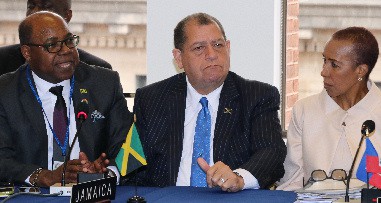Pandemics pose major threats on Global Tourism Industry

Photo by Derrick Scott
By Derrick Scott
WASHINGTON, D.C. – Jamaica’s Minister of Tourism, the Hon. Edmund Bartlett said “we can no longer ignore or give insufficient attention to the imminent threat of pandemics and, if we fail to do so, world tourism faces a myriad of global challenges in the event of a world pandemic”.
Addressing the International Monetary Fund (IMF) / World Bank discussion on World Bank presentation on the tourism industry and pandemics at the IMF/World Bank annual meeting in Washington, DC on Friday, October 13, 2017, Minister Bartlett told the delegates that among these threats are the possibility of location quarantines, fear to use airports and other centers of mass gatherings, fear of not knowing what to do in case of illness in a foreign land, the need for speedy diagnosis and cross-border medical insurance.
The Minister pointed out that experts have also warned that the world is nowhere near safe from the next pandemic.
He highlighted evidence including the number of new diseases per decade has increased nearly fourfold over the past 60 years, since 1980 the number of outbreaks per year has more than tripled, the 2003 SARs outbreak which started in Asia and quickly spread to more than two dozen countries in North America, South America, Europe, and Asia, and the 2009 H1N1 or Swine Flu outbreak that quickly spread to 120 countries and territories in about 8 weeks and was ultimately responsible for over 284,000 deaths according to the Centers for Disease Control and Prevention (CDC).
The Minister added by that there was the recent Ebola outbreak in 2014 which accounted for over 11,000 deaths, the HIV/AIDS pandemic which has affected more than 75 million people since its detection in 1981 and has resulted in over 35 million mortalities and, more recently, there have also been deadly outbreaks caused by migratory insect carriers such as the Chikungunya and the ZIka viruses both transmitted through mosquito bite.
Minister Bartlett pointed to a number of measures to counter the threat of pandemics. These included developing a comprehensive knowledge management and response system conduct targeted communication, factoring in the direct cost of medical care, surveillance and diagnosis, and public education, financially sustainable basic research to strengthen preparation, mitigation, response and rebuilding and a real-time, consistent, reliable and accurate flow of information to eliminate information asymmetries and improve panic responses.
Minister Bartlett added that there needs to be active networks involving all major tour operators, airports, cruise liners, attraction parks and other service providers, reserve human resources personnel with the skills and training to manage emergence response cases, regular simulation exercises that includes private and public sector participation, and strong participation of international organizations.

Photo by Derrick Scott
The Minister urged delegates and members of various non-governmental organizations (NGOs) that has a vested interest in both human and healthy security, free movement of human beings across borders, a sustainable tourism sector contributing to economic, social and political stability and a healthy ecosystem and a disease-free world to support the tourism sector’s initiatives to enhance its response capabilities to pandemics.




